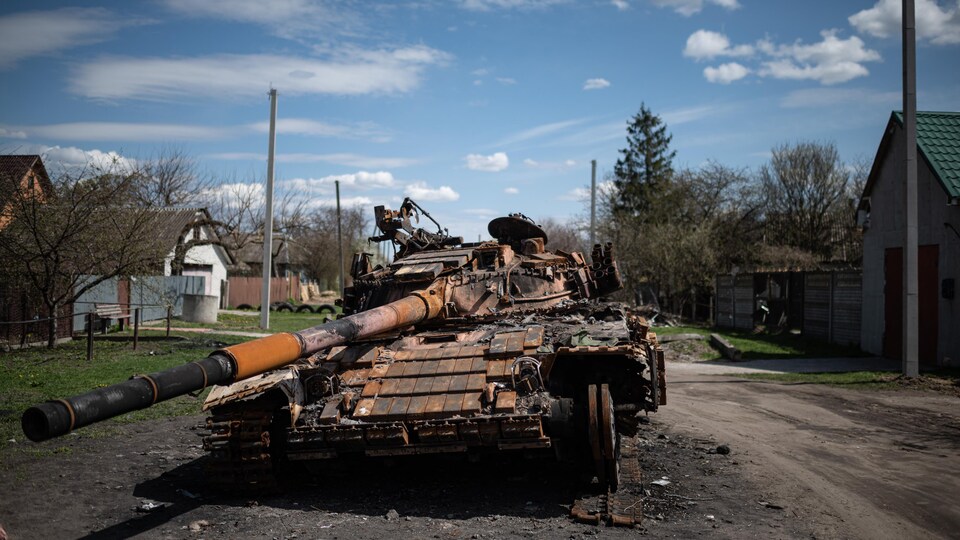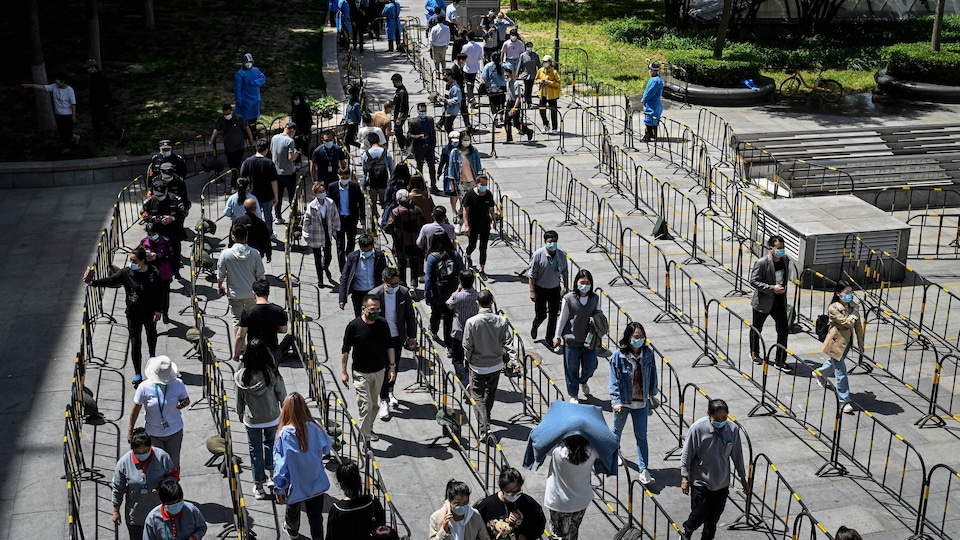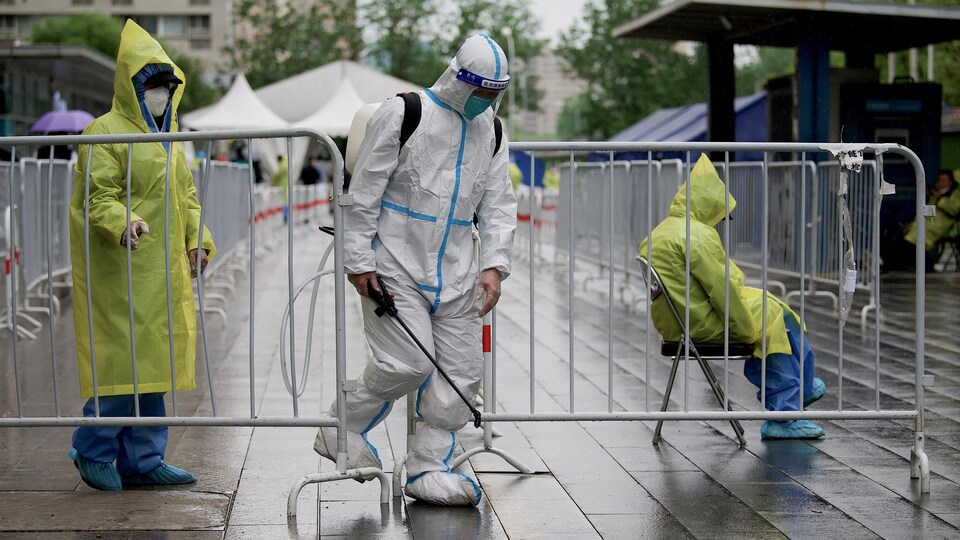War in Ukraine and COVID-19: these two crises dominate and still dominate the news. They are now trying two authoritarian governments: Russia with Vladimir Putin, and China with Xi Jinping.
Since the beginning of the 2010s, these regimes have constructed themselves, facing West, as a kind ofantipattern which, according to them, is superior in particular for its effectiveness in the face of a democratic model educatorbut in the midst of a crisis of legitimacy.
Over the past two years, President Xi has deployed, with an unbridled cult of personality, a full-fledged triumphalist propaganda claiming the very low number of COVID-19 infections in his country is proof of the system’s efficiency. socialist in the color of Chinacompared to a liberal, inefficient and outdated West.
President Putin, for his part, has been able to convince Western intelligent services that the modernization of his country’s army has been phenomenal over the past 10 years, and this is a sign of a new and formidable dynamism of the whole Russia.
In the last days of February 2022, these services-which however saw correctly the imminent and scale of the attack against Ukraine-mistakenly believed that the Russian army would do short work on the army. Ukrainian. The failures of the strategy zero covid by Xi Jinping, with the severe and prolonged incarceration of several major cities, as well as the difficulties of Russia’s military campaign in Ukraine, undermines the validity claims of these two regimes.
Cracked models?
Will these two crises shake the authoritarian model and provide arguments in favor of the Western democratic model?
The autocracies in Moscow and Beijing pride themselves on being more natural effective , while, according to the official line, legitimate, because supported by their populations. While the Western style of democracy, with its chaotic transition of power, its divisions, its short -term vision came from electoralism, this democracy is self -doubtful and no longer has the automatic support of the populations.
The liberal democratic system is producing twisted and sometimes monstrous effects, for example in the United States where some are beginning to raise the possibility of an institutional coup in the next presidential election of 2024, under the auspices of a right republic. made up.
France, another alleged model country, one of the states that invented the modern nation, now sees its legitimacy under attack from within. Characters like Marine Le Pen (far right) or Jean-Luc Mélenchon (far left) question the legitimacy of Emmanuel Macron, the centrist liberal re-election. And the truth is many of their countrymen think like them.
Efficiency questioned
Back to Russia and China: these two crises – the COVID pandemic and the war in Ukraine – originated in these two countries, in its very system. And now, what’s going on on the ground tends to question – for these two regimes – their reputation for excellence (should modernization of the Russian army) and their legitimacy. Faced with their own populations, albeit partially, but also and largely in terms of prestige in relation to the rest of the world.
These two crises refer to deep opinions and to a form of dogmatism, on the part of Russian and Chinese leaders, in the way they approach them. These battles in which they are fully engaged (by invasion abroad, or by the promise of 100% extermination of a virus) have become, for these regimes and their own will, essential tests of effectiveness and legitimacy.
For Vladimir Putin, because he refused to listen to those who told him to be careful, because of his doctrinaire notions on the non-existence and lawlessness of a country named Ukraine. But, victim of a form of self -deception, he still ended up in what turned out to be a quagmire.
Also try for Xi Jinping’s regime, that’s the approach zero covid, based on the idea of a total extermination of the virus, however seemed to work well for a year and a half. But now, he seems trapped in this technique, which has become inappropriate (or ineffective) due to an ultra-contagious variant called Omicron and its subsequent subvariants.
But the president has stuck to it, despite the enormous economic cost of such a policy. We saw them within a month of the complete closure of a city like Shanghai (25 million inhabitants, the engine of China’s economy).
Shanghai, since the beginning of April, has been a ghost town, with serious supply problems, a forced siege, frustrated population and even the beginning of an uprising against the authorities. By the end of April, a similar scenario seemed to have emerged in Beijing as well.
Numbers remain low
However, COVID numbers from China remain very low: 1,500 new cases and 47 deaths officially reported for the day of April 27 – in a country with 1.4 billion inhabitants. For an aggregate total, all included since the beginning of the pandemic, of 4,900 deaths, giving approximately 3 deaths per million inhabitants (in Quebec, by comparison: we are at nearly 1,800 deaths per million) .
So the first reaction is to say that the policy of zero covid, that works! Yes, but for how long? Against which variants? And at what economic value?
One can always argue that official statistics coming from a regime like this – where all communication on the pandemic, from the beginning, was ultra -controlled, ultra -politicized and determined propagandist – is certainly subject to caution.
But these statistics, even if they consist of little, even if, by pure hypothesis, we add zero (factor 10) to the published numbers, reflect an undeniable fact: the virus has spread there – and we emphasize this: to this day still – less than in North America or Europe.
Even with fraud in numbers and tight control over propaganda, China could never hide in the rest of the world a spread that would have reached proportions, for example, russian where brazilian. Impossible, I would have known. Conclusion: the official Chinese figures no doubt give – until now – a pretty good idea of the reality.
Why are you such draconian incarceration?
So the question comes back: with such numbers, why impose such draconian confinement? Because even these figures which, seen from here, seem small and enviable, are still overwhelming for the Chinese authorities, for Xi Jinping. For him, the zero covid should be taken literally: zero is zero and a COVID case is still a multiplicity case. The obsessive idea here – perhaps inherited from communism – is cleansing, extermination.
So this concept of lives with the virus, which is now naturally coming into the sixth wave (very contagious, but not too deadly, as long as there is immunity), this conception remains an abomination for the Chinese authorities. This equates to a rejection.
Let us add to this that President Xi Jinping was presented by Chinese propaganda as the glorious general leading the nation’s successful battle against the virus (official slogan). And that he made it a personal affair, with ideological rigidity to say the least. Criticisms and criticism are raining down on people who want to oppose him or whisper to him that maybe there is – in the Omicron variant – another way of looking at things. The answer is no.
It is therefore a highly political question and a case of ideological rigidity. Xi Jinping’s honor, which is considered infallible, and the stability of his hold on the Communist Party and the country are at stake.
An approach abandoned elsewhere
However, there are other countries that have followed this policy zero covidwhich resulted in her turning away.
Initially, for continuous application, the approach zero covid does not necessarily assume that there is a dictatorship behind. For about a year and a half, it has been successfully applied by democratic and pluralistic countries such as Taiwan, Australia, New Zealand and, to a lesser extent, South Korea. But when the Omicron variant arrived, this technique no longer worked. And in those countries, where information is spread, conflicting opinions, scientific opinions are available to everyone, we quickly understood that the situation had only fundamentally changed.
And we didn’t proceed, because we caught a glimpse of the horrible reverse side-along with new hypercontagious variants-of the approach. zero covid : the lack of immunity, especially in cases where the initial successes of the isolation strategy have led to the neglect of vaccination (with, moreover, in the case of the Chinese, national vaccines are less than in Western RNA vaccines).
In addition, vaccination in the elderly has been neglected. Unlike New Zealand or Taiwan, China is not a country where ideas and contradictions flow freely. In China, there is a Supreme Commander -we can bring here the parallel with Russia-, a commander who centralized decision-making, killed dissent, refused specialist advice, sowed around him a fear of dissatisfaction and opposition.
And it provides, now, of mass confinements, disproportionate: a city like Shanghai has completely stopped, initially, for several dozen cases. In the face of a virus that, in total and proportion, has so far killed 600 times fewer people than in Quebec, and 2000 times fewer than in Peru!
Source: Radio-Canada


